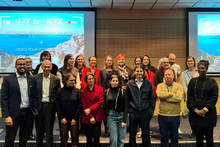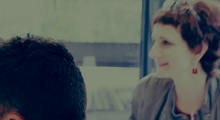A look back at the first Réussites Solidaires: working...

A Kedger has developed an agency specialising in "silver marketing", public relations aimed at seniors.
According to studies, the “Silver Economy” (or senior economy) will be worth 130 billion euros in 2020. It is on this projection that Yves Bozzi, 2005 KEDGE graduate, has positioned his marketing agency "Digital Baby Boomer"
To begin, tell us about your educational background. What did training did you have while at KEDGE and before attending KEDGE?
Something which is unusual for business school students is that I did the Hypokhâgne / Khâgne (preparatory class for literature) before attending KEDGE. I wanted to work in advertising. The myth of the copywriter! During the orals, I fell in love with Marseille and for the KEDGE campus. Although I was accepted by a good number of schools, I knew I wanted to study here. That was four wonderful years of my life! I joined the students’ union (BDE) at the beginning of an unforgettable campaign that we won. The events we organised every fortnight: the gala, the new student orientation weekend… all that was very instructive in terms of organisation and resistance to stress. It was also demanding. For example, it was out of the question for the BDE not be open early to meet the printing and binding needs of students. Finally, participating in the students’ union helped forge lasting ties. We are still close sixteen years later. During my time at the university, I essentially took marketing courses, always with the view of it developing into advertising. Incidentally, via student union we organised a “Sup de Pub” where experts came to talk to us about their job. Unsurprisingly, my first internship during my césure (sandwich/work-study year) was at a marketing agency: six months at a Marseille company. Interestingly, the entire time I realised that I needed to be in the field, that I couldn’t stay behind a computer all day. So for my second internship, I tried a more sales-oriented position, and so spent a semester with Unilever as a sales manager. This was a revelation. I loved sales. I encourage taking a sandwich year. It lets you face up to the reality of your fantasy jobs and to deconstruct any preconceived ideas about them.
Tell us about your career path once your studies ended. What positions have you held? What did you learn at those jobs?
Julien Casel (who was also with the student union) and I had a goal to create our own business. A year after school, we left to make our mark in Paris. The internet seemed to us to be the ideal way to launch our business because our finances were limited. In 2006, the business site vent-privee.com really began to take off. We decided to create a site with the same concept. We were not the only ones to jump on the bandwagon, because in 2006 you could count 80 private sales websites (Showroom Privé, Shopping Privé, Club Privé, Espace Max...), only we named ours Fruitrouge.com to distinguish it from others. In 2009 - which was our best year - we had a turnover of more than 6 million euros and had about 20 employees. In 2008, given that there were no private sales sites in the US, we moved to NYC. I was only 28 at the time. I spent a year there and set up a team of five people, but it didn’t work out as well as we wanted. In retrospect, 2008 was the year of the global economic crisis and was not the ideal time to start a business in the US! However, we also made some mistakes:
1) Raising funds that were sufficient for a young French start-up (400K€), but were way too low for the American market. (two American actors who also launched businesses in the sector around the same time had each raised more than $10 million), and
2) trying to use the same business concept in the US as we used in France. For example, instead of trying to limit ourselves to the east coast, we tried to distribute our products throughout the entire countr, (which is what we did in France from the beginning) even to states that were furthest away and where delivery costs could be up to five times more expensive.
In 2010, I decided to learn more about web marketing by going back to work as a salaried employee. Up through 2016, I worked for several companies as Head of Acquisitions with Come & Stay (now Nextedia), Commercial Director of the Drive promotion with High Co., and finally France Sales Director with Public-Ideas (now TimeOne). These experiences helped me deepen my knowledge of several leveraging tools and solutions on the web, such as emailing, programming, drive-to-store, and coupons, amongst others.
Today you are once again an entrepreneur. Tell us about your project.
In spring 2016, several “signs” appeared:
- I purchased sociologist Serge Guérin’s book “Silver génération. 10 idées reçues à combattre à propos des Seniors" (Silver Generation. 10 preconceived ideas about Seniors to fight against) a after hearing him on an episode of Soft Power on France Culture;
- In the company that I worked, more and more advertisers were asking us to specifically target seniors; and
- My mother retired and I noticed that the baby-boomers (those born between 1946 and 1964 – around 15 million persons in France) around her approached this stage of life with equanimity by increasing their activities and staying strongly connected.
I noticed that there wasn’t any marketing agency that was 100% web-based and that was 100% geared towards those over the age of 50. I started to get the itch to be an entrepreneur again. I also wanted to take advantage of the know-how I acquired during those years in the digital world. So I decided to create this agency! The goal of Digital Baby Boomer is to provide web marketing solutions for advertisers to reach those 50+, mainly via three areas: Strategy & Advice, Acquisitions, and Special Operations.
In just two years, we have more than 20 clients in all sectors: health, insurance, fashion, real estate, at home services… and even dating! The Silver Economy (or Senior Economy) is a booming sector. From a purely-numbers point of view it a real opportunity - a driver for growth and jobs. We’re talking about 130 billion euros in 2020. But this also raises questions about society, long-term visions, transgenerational links, public strategies, the Silver Economy flirts enormously with sociology!
8 #seniors sur 10 estiment qu'#Internet contribue à améliorer leur quotidien. 70% ont un #smartphone et un ordinateur. 55% achètent #online plus d'une fois /mois. Découvrez notre #Infographie. Conférence dans 1h. #Silverexpo #Silvereco pic.twitter.com/FbV2Ib7Bgp
— Digital Baby Boomer (@digitalbabyboom) November 15, 2017
(8 out of 10 seniors say that the internet contributes towards the amelioration of their daily life. 70% have a smart phone and a computer. 55% make online purchases more than one time a month. See our graph. Conference in one hour #Silverexpo #Silvereco pic.twitter.com/FbV2Ib7Bg — Digital Baby Boomer (@digitalbabyboom) November 15, 2017
What are your development goals for the future?
Our goal is to become the model for silver marketing in France. The growth between our first year and our second year was significant. If we maintain this pace, we could position ourselves as a market leader within the next years. Above all, what we are aiming to do is to raise the awareness that every company that markets products or services must take into account the senior dynamic and that every company from the Silver Economy must put digital in its list of priorities, as well as other issues. Finally, if among business school students consider the Silver Economy to be a dynamic sector - a creator of growth - our gamble will have paid off
We were nominated in the Best Service Provider category last year at Silver Night (the flagship event of the silver economy), and we also participated in a conference at the Silver Economy Expo ("How to Communicate with Seniors on the Internet") in Paris in November 2017, and at the Longevity Congress ("The New Manner of Communication") in May 2018 in Bordeaux. Finally our report "Seniors and the Internet" (en francais) which came out last year, was reported by several media outlets, including Le Figaro, Parisien, Télématin on France 2, Sud Radio. (Figaro article: https://hubs.ly / H0dfrFN0).
What did you learn at KEDG Business School that helped you in both your career and with this project?
My time at KEDGE reinforced two virtues that I believe are indispensable in the professional world: curiosity and responsibility. Curiosity to be on the lookout for what’s happening, for other ways of thinking, and also to question your convictions. Responsibility, because once decision is made you have to go all the way and you must take responsibility for your actions.
What advice would you give to KEDGE students who’d like to become entrepreneurs?
I would tell them to fully enjoy the years they spend at Kedge. It’s more than just the courses. In my opinion, it goes beyond mere education. I talked about participating in the student union but additionally, in second year I hosted the reception dinners for those who passed the entrance exams. I wanted to show our dedication to school, and to do what I could for them to choose our school! I would also tell them not to worry if they do not have a clear career plan at the end of their studies. A career is made up of sudden developments, people you meet, taking breaks, and ... luck.
Find out plus :






0 Comment
You must be logged in to leave a comment.
No comment